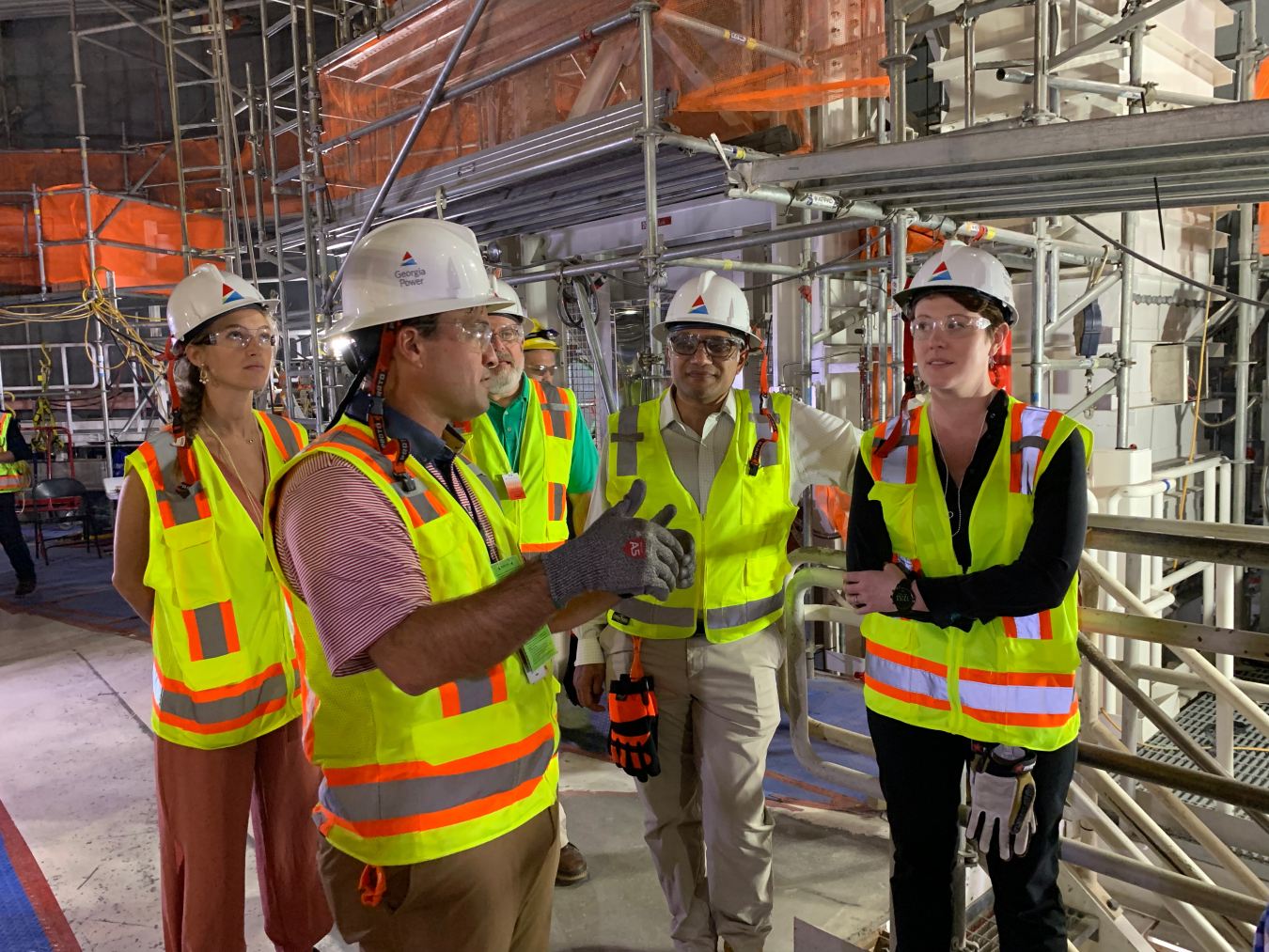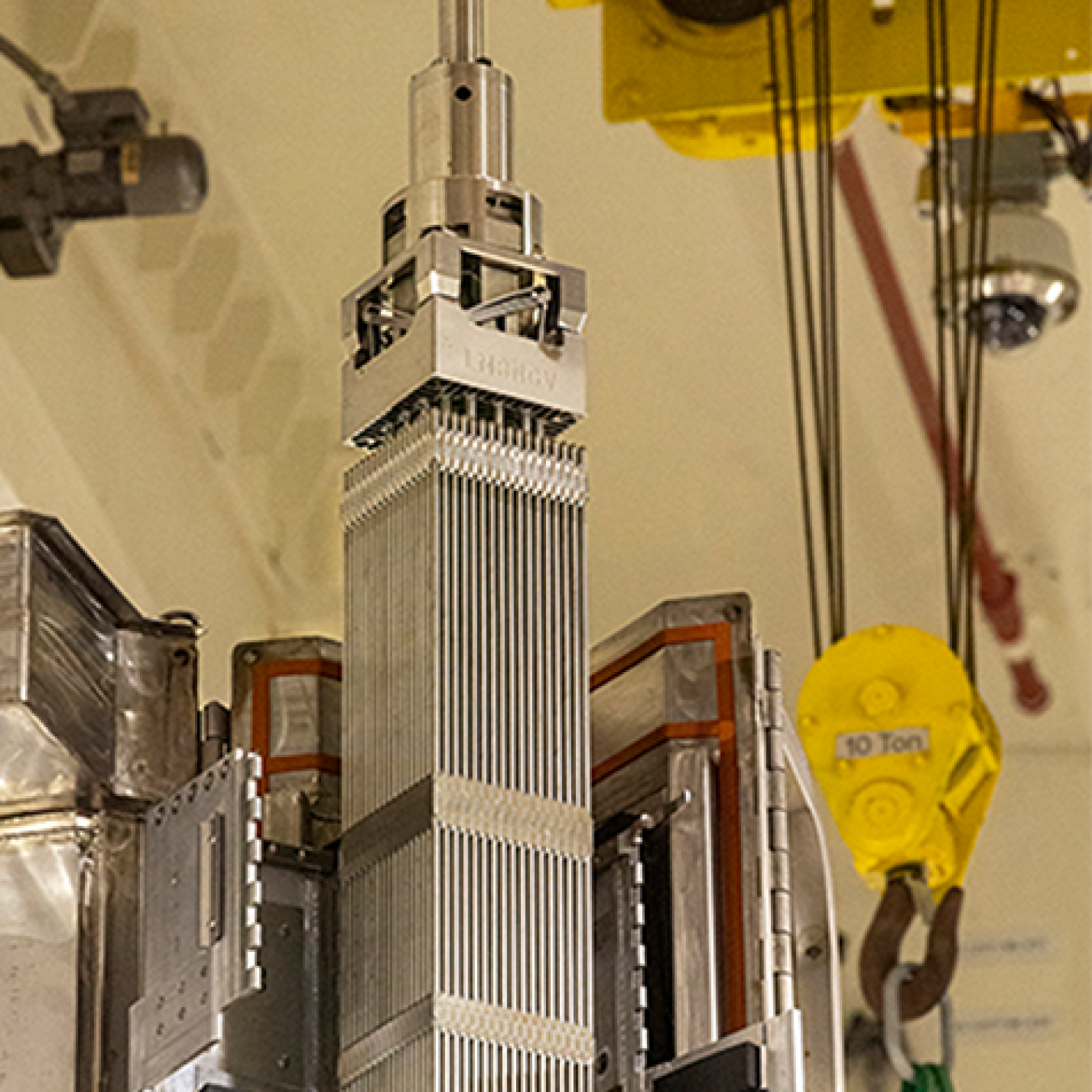The Loan Programs Office is helping to accelerate the clean energy transition and unlock the full potential of nuclear energy by financing Vogtle Units 3 and 4
October 28, 2022
On the heels of the New Nuclear Capital Symposium and the International Ministerial Conference on Nuclear Power in the 21st Century, our communities are tasked with critically important work to accelerate the clean energy transition and unlock the full potential of nuclear energy.
While nuclear energy has been quietly powering America with emissions-free electricity for more than 60 years, the Vogtle Units 3 and 4 project was the first new nuclear power plant to be licensed and begin construction in the United States in more than 30 years.
In Q1 2023, the first of those two units will come online. This event will mark the beginning of a new chapter in U.S. nuclear energy—a time when leading edge U.S. advanced nuclear technologies are increasingly in demand domestically and abroad.
Vogtle restarted the U.S. nuclear industry, and this was not an easy process. The project’s owners—Georgia Power, Oglethorpe Power, MEAG Power, and the City of Dalton—stepped up to initiate this project, and DOE’s Loan Programs Office committed financial support and technical expertise to see it through. Ultimately, the total cost and timeframe of Vogtle Units 3 and 4 are a reflection of what it took to restart the nuclear industry in the U.S. And, long-term partnerships between industry and government were central to the delivery of the program.
Partnering for Delivery
In February 2010, DOE offered conditional commitments for a total of $8.33 billion in loan guarantees for the construction and operation of two new, innovative 1,100 megawatt Westinghouse AP1000® nuclear reactors at Plant Vogtle. However, the domestic nuclear supply chain and skilled workforce needed for a project of this size had been reduced substantially due to the lack of new nuclear construction over a generation. This, along with “first of a kind” issues typical of building such a project, created challenges that resulted in significant delays and project cost increases.
In March 2019, DOE announced up to $3.7 billion in additional guarantees of loans to finance the continued construction of Vogtle Units 3 and 4. This additional financing represented DOE’s commitment to both seeing the project through to success and catalyzing a new nuclear industry in the United States.
The construction of two new nuclear reactors at Vogtle will generate thousands of new jobs, supplement the two existing reactor units at the site, and provide more than 17 million megawatt-hours of clean electricity annually—enough reliable electricity to power more than 1.6 million American homes while avoiding nearly 10 million metric tons of carbon dioxide emissions annually.

Driving Decarbonization Goals Forward
Fast-forward to October 2022, with more than 9,000 construction jobs at peak and 800 permanent jobs once the units begin operating, Vogtle is currently the largest jobs-producing construction project in the state of Georgia. Additionally, Georgia Power recently reported that fuel load into the Plant Vogtle Unit 3 reactor core has been completed, marking a historic milestone toward start-up and commercial operation
Georgia Power’s chairman, president, and CEO Chris Womack stated, "The Vogtle 3 and 4 nuclear units represent a critical, long-term investment in our state's energy future, and the milestone of loading fuel for Unit 3 demonstrates the steady and evident progress at the nuclear expansion site.”
Plant Vogtle’s progress is inspiring, and the momentum is building for U.S. nuclear energy at a time when the environment is pressured by energy security and cost. But it’s not just about one project. LPO’s partnership with Vogtle is helping our allies around the world recognize the United States as a global nuclear industry leader, leading the conversation on developing and manufacturing advanced nuclear technologies. The project also sets the stage for the next generation of our advanced nuclear fleet, including small modular reactors, to be manufactured and deployed here at home to help meet our climate and clean power goals.
The recent passage of the Inflation Reduction Act (IRA) provides approximately $369 billion in climate provisions, making it the most significant piece of climate legislation in U.S. history. The investments and tax incentives for clean energy technologies that are included in the IRA guarantee a commitment to nuclear energy that will continue well throughout the nation’s journey to net-zero. And innovations like the new generation of U.S.-designed small modular reactors are already changing the way we think about reliable, clean, and affordable nuclear power across the globe.
The United States has been recognized as the leader in advanced nuclear reactor technologies and expertise around the world. The completion of fuel loading at Vogtle nuclear plant is another step forward in energizing American innovation and clean energy.
The Vogtle nuclear plant was made possible by approximately $12 billion in loan guarantees issued by DOE’s Loan Programs Office, which finances next-generation U.S. energy infrastructure and advanced vehicle technology.
As of today, LPO has received over $12 billion in loan applications from developers across the nuclear supply chain. With projects like the Vogtle nuclear plant, the United States is once again being looked to as an exporter of nuclear technology and leader in achieving our energy, climate, and jobs goals.

Working with LPO
It is said that “the journey of a thousand miles begins with one step.” And to that, I would just add you don’t have to go it alone. Take the first step by connecting with LPO’s Outreach and Business Development team for a no-fee, no-commitment, pre-application consultation prior to submitting a formal application.
You may request a pre-application consultation by emailing [email protected].
Jigar Shah

Former Director, Loan Programs Office
Jigar Shah served as Director of the Loan Programs Office (LPO) at the U.S. Department of Energy (DOE) from March 2021 to January 2025. He led and directed LPO’s loan authority to support deployment of innovative clean energy, advanced transportation, and Tribal energy projects in the United States. Prior, Shah was co-founder and President at Generate Capital, where he focused on helping entrepreneurs accelerate decarbonization solutions through the use of low-cost infrastructure-as-a service financing. Prior to Generate Capital, Shah founded SunEdison, a company that pioneered “pay as you save” solar financing. After SunEdison, Shah served as the founding CEO of the Carbon War Room, a global non-profit founded by Sir Richard Branson and Virgin Unite to help entrepreneurs address climate change.
Shah was also featured in TIME's list of the "100 Most Influential People" in 2024.
Originally from Illinois, Shah holds a B.S. from the University of Illinois-UC and an MBA from the University of Maryland College Park.

